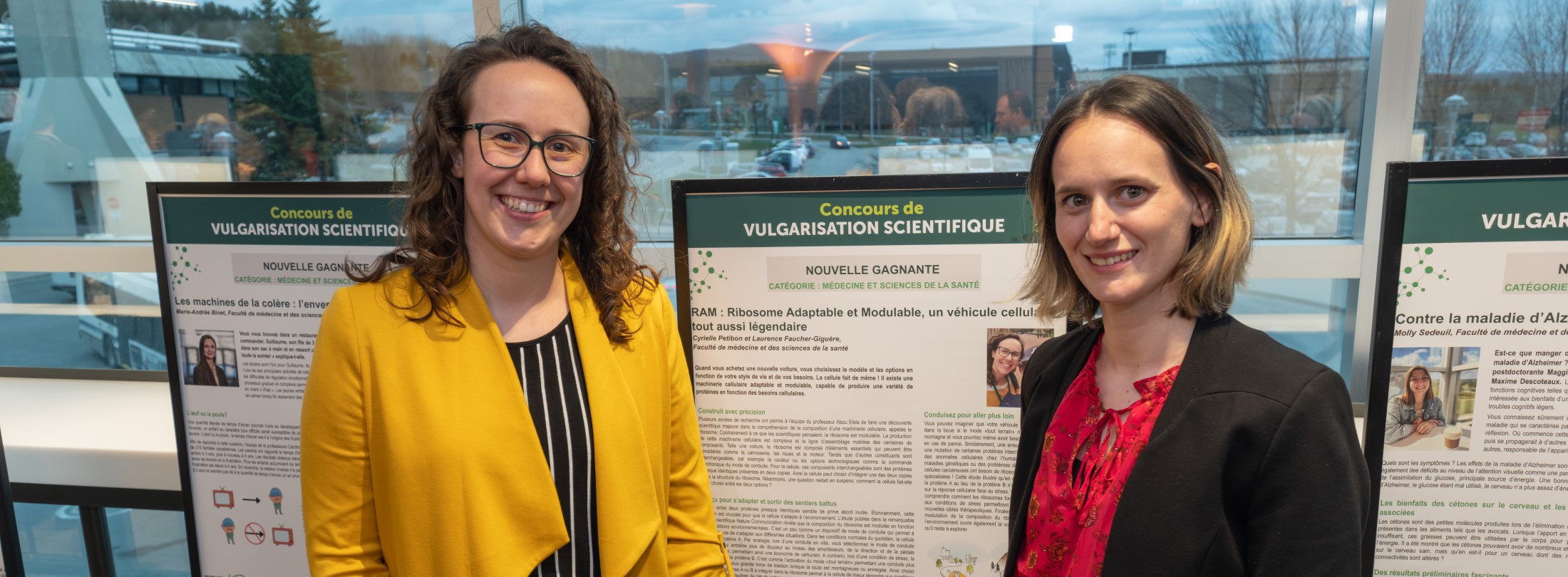Best Doctoral Thesis Award
The Best Doctoral Thesis Award acknowledges the excellence of a doctoral thesis in each of the three major research areas: Natural sciences and engineering, health sciences and arts, and humanities and social sciences.
The evaluation criteria are contribution to the advancement of knowledge (originality and significance), recognition of research value in the discipline(s), and potential for a career in research.
2023 Recipients
Francis Loignon-Houle
Medicine and Health Sciences
The future of imaging
As part of his thesis, PhD student in nuclear medicine and radiobiology Francis Loignon-Houle has decided to work on the infinitesimal microcosm to lay the foundations for cutting-edge technology that could save many lives.
Under the direction of professors Roger Lecomte, Réjean Fontaine, and Serge Charlebois, the young researcher put his visionary spirit at the service of medical imaging to find solutions that can speed up the detectors used in positron emission tomography (PET). This type of 3D imaging is commonly used in research and in clinical settings to detect cancers, among other things.
His research combines nuclear medicine with electrical and computer engineering to focus on exploiting an avant-garde concept well known within the research community, but not yet formalized: photon ultrafast time-of-flight. The student succeeded in formalizing this highly promising concept by identifying the physical and technological obstacles, and then developing original solutions, some totally unprecedented, to overcome them. Described as a tremendous step toward the next revolution in PET medical imaging, his thesis received honours both for the relevance of its content and for the quality of the writing.
Simon Boudreault
Medicine and Health Sciences
Better defences against viruses
In the body, there is a silent struggle between human cells and viruses. This battlefield provides valuable information on the mechanisms used by viruses to evade our immune system and win this struggle essential to their survival.
For his thesis, biochemistry PhD student Simon Boudreault studied alternative splicing, a key process that occurs inside human cells. In three studies published in recognized scientific journals in the field, the student has highlighted a particular relationship between the viral μ 2 protein and the cell’s U5 complex, which affects the functioning of the latter as well as the ability of cells to defend themselves against infection by reovirus, the virus under study.
This discovery is of great importance, as it clearly demonstrates that viral infections are far more complex than previously thought in terms of the expression and regulation of genes in the infected cell. Thanks to this work co-directed by Professor and Vice-Dean Martin Bisaillon and a researcher from the Université de Montréal, Professor Guy Lemay, the development of new antivirals targeting the splicing machinery is now possible. This exceptional work has opened new paths in a growing field.
Guillaume Theaud
Natural Sciences and Engineering
All-out against brain disease
Thanks to algorithms developed in neuroinformatics, medical imaging is now focusing on improving the life of people living with neurodegenerative diseases, Alzheimer’s, and multiple sclerosis.
For Guillaume Theaud, a PhD student in computer science, a blind spot had nonetheless evaded research. Indeed, from his first baby steps in the laboratory when he was only an undergraduate, he noticed that the data used to develop these algorithms was collected only from young and healthy subjects. This did not reflect the reality of clinical and applied research, which also tests computer tools on the elderly or subjects with pathologies.
As part of his thesis, Guillaume therefore undertook to develop methodologies and tools adapted to all these patient profiles. Among his innovations, the TractoFlow tool has already been downloaded thousands of times in four countries. The professor who directed the work, Maxime Descoteaux, is full of praise for this prolific student whose practical ideas left a mark in his laboratory; a superstar, as he put it. A remarkable thesis that yielded important scientific contributions.
Charles-Étienne Daniel
Humanities and Social Sciences
Legislating robot development
The advent of interactive robots endowed with artificial intelligence, such as assistance robots, drones, and autonomous cars, raises many questions of governance. Their growing autonomy and potential for unpredictability could pose challenges to our societies. A normative framework is needed.
It is in this context that PhD student in law Charles-Étienne Daniel, now a professor of law and technologies, has developed analytical tools that will make it possible to better troubleshoot the legislative strengths and limits to govern the development of interactive robotics. Totalling 699 pages, his thesis offers a detailed reflection on the means to be considered to ensure responsible supervision of these technoscientific innovations. This remarkable and long-term work will offer tangible support to stakeholders seeking to make the right decisions with regard to future disruptive technologies.
Charles-Étienne’s thesis stands out on several points. Its interdisciplinary character combining law and engineering is one of its salient highlights, according to the two faculty members who supervised the research, Louise Bernier, Law Professor, and François Michaud, Electrical and Computer Engineering Professor. This relevant work on a contemporary subject will yield an immediate impact.




